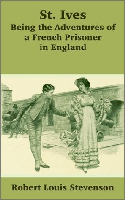Toise
Q From Daniel J Matranga: I came across toise in St Ives, by Robert Louis Stevenson: “‘Are you acquainted with the properties of the spine?’ he asked with an insolence beyond qualification. It was too much. ‘I am acquainted also with the properties of a pair of pistols,’ said I, toising him.” Any idea what it means exactly? Is it a typographical error?
A This is possibly the most obscure question I’ve ever been asked. My reason for including it is that it leads us up an interesting linguistic byway, where I hope you will not abandon me in despair at my antiquarian investigation of the incredibly obscure.
The rag-bag of miscellaneous recollections that I call my memory reminds me that a toise was an old French unit of length. By an unremarkable coincidence, it appears in an SF book I’ve just been reading, Brasyl by Ian McDonald, in which the speaker is French: “The Amazon drops only fifty toises over its entire length”.

Contains toising
A few moments’ enquiry turned up the extraordinarily useful fact that a toise is six French feet or about two metres, six and two-fifths English feet. It derives from Latin tensa (bracchia), the outstretched arms, from tendere, to stretch. It was the distance between the fingertips when an adult male stretched his arms out horizontally side to side.
The most interesting thing about it, the word in this sense being long defunct in France and virtually unknown everywhere else, is that it’s closely similar to the nautical fathom, long regularised as six feet. Fathom is from Old English, in which it refers to the same distance measured in the same way.
Without doubt, fascinating cross-language stuff. But what does it have to do with the matter?
The only person the Oxford English Dictionary cites as a user of the verb is Stevenson, both in St Ives and in his earlier work, The Master of Ballantrae: “At the same time he had a better look at me, toised me a second time sharply, and then smiled.” The OED says that it is “very rare”, an undeniably accurate statement, since no other example exists in literature — at least that I can find. Stevenson being Scottish, I wondered if it might be a Scots term, but nothing like it appears in any of my dictionaries. It seems to derive directly from the French verb toiser, originally to measure, a source that makes sense for two reasons — Stevenson spent a great deal of time in France and St Ives is the story of a French prisoner of war imprisoned in Scotland at the end of the Napoleonic Wars.
My Larousse tells me that in French toiser today means to regard someone with contempt or defiance. So, to toise is figuratively to measure someone, to eye them from head to foot in an appraising and disapproving way. A century ago a critic in The Reader said that Stevenson’s usage “seems a trifle strained”. Can’t dispute that.
